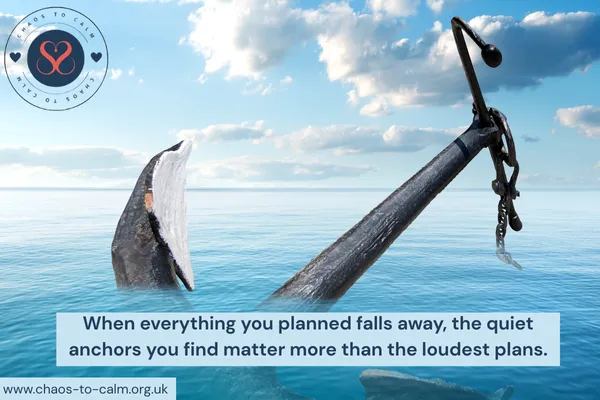
When the trip disappears: choosing the hospital over the holiday...
When the trip disappears: choosing the hospital over the holiday...

The first part of our story
Content warning: this post talks about self-harm, suicidal feelings and a psychiatric admission. If you are in immediate danger, please call 999. If you are in the UK and need to talk, Samaritans are available 24/7 on 116 123 and Mind’s information line can offer support and signposting.
Last Tuesday I should have been stepping on board an all-expenses-paid cruise. My parents were coming from France to stay with my daughter while I was away. Plans were made, cases packed, and I had the small, excited flutter that comes with a proper break.
Instead, Monday morning arrived differently.
My daughter went into full-blown crisis. She was self-harming and had started saying she wanted to die. The kind of words that make the world tilt and the house go very, very quiet. We called for help, we stayed close, and we tried everything we could think of in that moment, the things that normally work, the things we’d practiced, the words that usually find a tiny gap for calm. None of it was enough.
By Monday evening, she was admitted to a psychiatric unit. It wasn’t an easy decision. She said she would rather die than go. We talked, we stayed with her, and slowly, very slowly, she agreed to go voluntarily. That decision felt like both a relief and a heartbreak. Relief because she was safe. Heartbreak because nothing about that day felt right; not the words, the feelings, or the choices carved out of necessity rather than willingness.
For now, I want to stay with that first stretch of the story, the moment the holiday evaporated and the option became a hospital bed and people in uniforms who would try to hold her steady while we couldn’t.
What it felt like, on the inside.
There’s a strange, heavy silence that follows a crisis like that. People say “I’m so sorry” and mean it, but the words feel small. I felt flattened by exhaustion and a fierce, panicky protectiveness. My first instincts were practical, calls, logistics, who comes, who cancels and immediately underneath there was huge feelings of guilt and grief.
Guilt, because maybe I missed signs. Grief, for the holiday we’d booked, for the image of my parents laughing in the kitchen while I relaxed. Fear, for what this means for her future. And tired: a bone-deep tired that seems to live in every parent who spends a long time worrying about a child.
If you’ve been through something similar you’ll recognise it: the simultaneous urge to crawl under a duvet and the urgent need to DO something. Both are true, and both are valid.
What we did that helped (in that first 24–48 hours)
I want to be clear, nothing about a crisis is one-size-fits-all. What helped us in those first terrible hours might not be right for everyone, but a few things made a difference and felt worth sharing:
Staying physically present. Even when words felt clumsy, sitting with her, holding a hand, staying in the same room mattered. Safety often begins with proximity.
Clear, calm choices. When everything feels chaotic, offer two small options rather than infinite questions. It reduces overwhelm.
One person to coordinate. When multiple people panic, things get messy. We picked one person to make calls and coordinate, it saved a dozen small, stressful conversations.
Honesty with professionals. We told the admitting team exactly what she said and did. It felt brutal in the moment, but it meant she got the care she needed fast.
Permission to cancel. The holiday disappeared, and with it came permission to grieve that loss while we focused on what mattered, her safety. Cancelling the trip was a practical step, and it released a small part of the cognitive load.
What I felt I couldn’t say
There’s a weird social awkwardness around cancelling because of a mental-health crisis. People are kind, but they don’t always know what to say. I wanted to explain everything to everyone, my parents, the friends on the trip, but I also needed privacy and space to be with my daughter. In the end, a short, honest message did the job: “I can’t come. My daughter is in crisis and needs me here.” Most people were kinder than I expected.
An anchor to hold on to
When the world tilts, I go back to a small image I call my anchor: nothing dramatic, just the thought of Keira and Biscuit curled up, a hot mug, and a beach walk where the sea makes everything feel a bit less sharp. It’s not a fix, but it reminds me there is something steadier beneath the chaos. Anchor imagery helps me breathe when the panic starts to swell.
This is the start of the story
There’s more to tell, the admission, the conversations with the ward team, the the long hours by the phone, being there when she needs me, whatever time of day, and the small, guarded wins. For now, I wanted to write what that first raw day felt like because sometimes naming the moment stops it swallowing you whole.
If you’re reading this because you are in the middle of a crisis, or because you love someone who is, you are not alone. The fear is real, the exhaustion is real, and so is the possibility of tiny, steady steps forward.
I’ll write the next part, the hospital stay and the first steps after admission, soon.
Your calm in the chaos,
Sami
(If you’re in immediate danger, call 999. If you need to talk right now and you’re in the UK, Samaritans 116 123 are available 24/7.)
